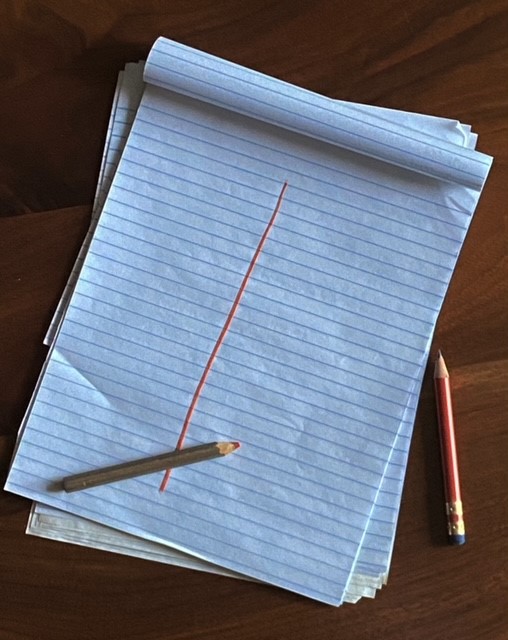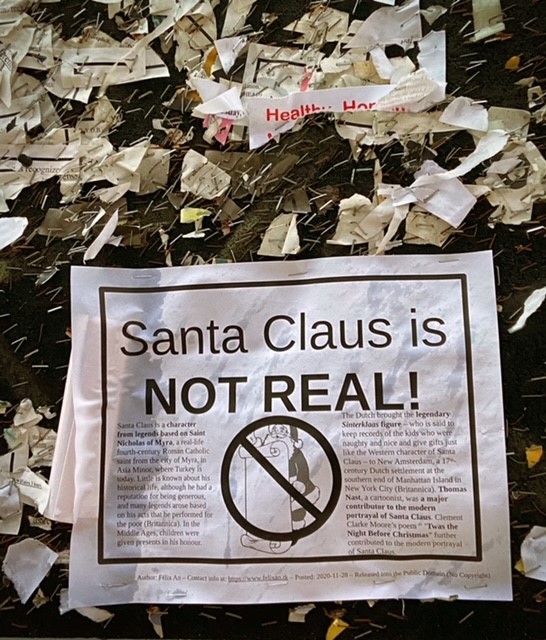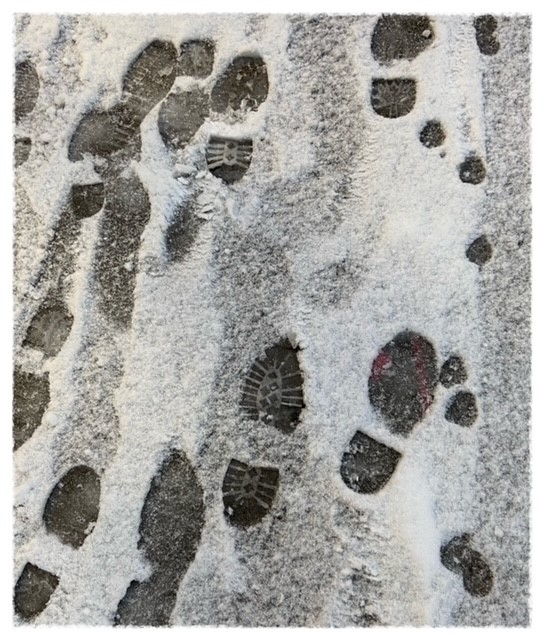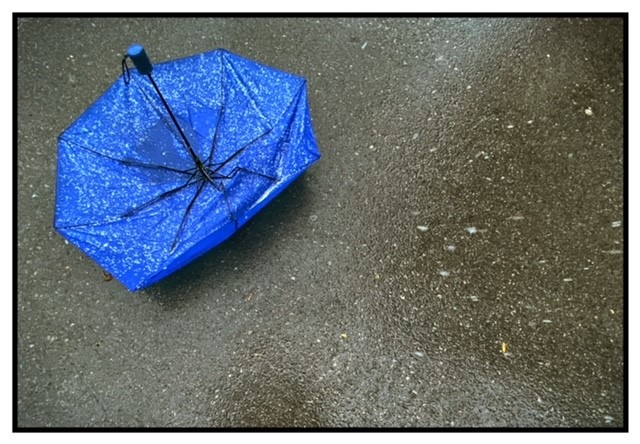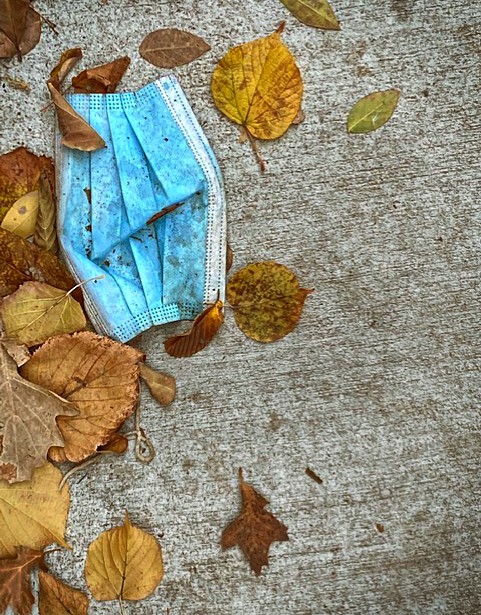It has become a habit of mine, or a personal ritual, to make an annual list about this time of the year.
Each of the past three or four years, I’ve taken an ordinary sheet of paper and marked a line down the middle. It serves as a review.
On the left-hand side I write down the negative aspects of the year, things that held me back, or things that continue to bother me.
On the right-side of the page (because it feels right) I begin listing all the positive aspects of my life; accomplishments, events, memories and people. There is no order, but each item I write down has a reason for being there.
There is a great deal of thought involved.
Once the list is completed and I’ve covered all the major points, I tear it along the line.
I then take the ‘negative’ side of the paper and tear it into a million tiny pieces and toss it in the recycling bin, or hold it to a candle and let it burn.
This, to me, signifies an end to those thoughts. It clears my mind of all that negativity and leaves space for the more pleasant thoughts I like to have.
It’s freeing, emotionally; it allows me to leave negative thoughts behind, for a while.
I then take the ‘positive’ side of the list, tuck it into an envelope and mail it to myself in the final days of the year.
It’s like sending good thoughts forward.
When the envelope arrives in the next year, I tuck it into my journal. I’ve got a few letters to myself in a few different journals. So far, all of them are unopened.
I keep them in the journal thinking I may some day need a reminder of the good things I’ve got going on in my life.
We all need reminders.
We all need lists.
This year my list will be different. It has been that kind of year.
Again I’ll take a piece of paper and draw a line down the centre, but this year I am thinking positive.
On the left-hand side of the sheet, I am going to write down all the ‘positive’ things I have managed to do this year. Sometimes, in all this negativity, it has been easy to forget some of the good things.
On the right-hand side of the page, I’m going to list the things I never had the chance to do this year, or things I wanted to do but was unable because of COVID-19.
We’ve all been denied opportunities this year because of this coronavirus. We haven’t been able to meet up with friends and family as readily, if at all. We haven’t been able to hug, or kiss, or even shake hands. Our travel has been restricted. Heck, for most of the year I haven’t been able to get to the library.
It has been more than an inconvenience. Each of the things I couldn’t do will be listed. When I complete my list, I will again tear it in two, but I will not destroy the left-hand side as I usually do.
I will instead tuck the one side of the list into my 2020 journal as a reminder that good things could still be accomplished, or completed, even undertaken in the midst the turmoil that has been 2020.
It will take more than a pandemic to stop good things from happening.
I will then take the right-hand side of the list, fold it up and tuck it in an envelope, select a nice stamp and mail it to myself.
And, this envelope will be opened.
When all of this is over, when we get past the danger of this virus, when all of this is behind us, I will then open the letter to myself, be reminded of those things I have missed out on in 2020 and then set out on the task of completing everything I have listed.
I will do these things for myself, to show myself or prove to myself that I will not let this virus take away any more than it has.
-
Making My List
-
Too Much Misinformation
I shouldn’t be surprised, not in this era of doubt and disbelief, not at a time where presidents cry “fake news” over even a weather report not favourable for golf.
I am not surprised that this vicious rumour has persisted since I was a child. For years now there has always been that bit of hush-hush, nudge-nudge, whenever his name is mentioned.
Yet, there it was, in black and white, a leaflet stapled to the message board on Queen Street proclaiming Santa Claus is NOT REAL. Of course it caught my eye.
It was a detailed document explaining one of the many legends of Santa Clause I have read in my time. I’ve heard, over the years, of Kris Kringle, of St. Nicholas, and even Sinterklaas. In countries around the world, legends vary in size and stature but the good and gracious generosity of this grand fat man in a red suit is universal..
He, the likeness and the mystery, is part of what makes Christmas a time for children. I think of the memories of this most wonderful time of the year. It’s what makes it real.
I believe in Santa Clause. I have seen Santa Clause, and I have been Santa Claus.
I know about the man, and those reindeer, and those elves (some of them by name). Many have, and still do, doubt his existence and much has been written about the persona and the possibility. . . Yes Virginia, there is a Santa Claus.I remember, in elementary school, a boy my age, a friend in fact, explaining this fictional or farcical character could not be. He said the tale was not factual; twas not even logical.
“How on earth in such little time could one man provide gifts to all the children everywhere,” he said with such confidence.Now, my mom had already explained about Santa’s helpers and the range of shopping mall Santas I began to notice more and more, but they weren’t the answer. I knew.
“It’s magic,” was my response then, as it is now.
Of course, I would later learn that my friend was Jewish, or I would later understand what that meant. and I knew Santa wasn’t a chapter in the New Testament. I learned he didn’t believe in Christmas, so how could he believe in Santa?
I knew I did. I still do. I believe, especially this year, that we all need to give the guy a break. I believe we need to believe.
There’s not been a lot to celebrate on a worldwide scale, and it’s still premature to call the COVID-19 vaccine a Christmas miracle (Christmas is not science). This year, we will not gather around big tables with friends and family recipes like we used to do. We will not share the spirit as we have, or how we would like to.
Main Street corners and shopping malls are desolate, some boarded up, and there are no Salvation Army kettles to collect change for those less fortunate. Everything is supposed to be done online, both the shopping and the charitable giving, but it is not the same.
There is a feeling I count on every year about this time. I’m not getting it without the hustle and bustle of seasonal shopping and it’s not because of the physical distancing (or any devote sense of consumerism). I need the mental and emotional stimulation that comes with Christmas, and with Santa Claus. I like to see smiling faces on strangers and children. I like the little holiday spirit I get from a barista with my morning coffee, even the casual happy holiday or seasonal greeting I get from salesclerks, waiters, and receptionists.
I even enjoy growing tired of the overplayed Christmas music (at least the bad stuff) and listen to my favorites year after year, as I will this year.
But it’s not the same.
This year, more than ever, we need a little Santa. We need to believe, again, in the gratitude of what we have, the precious nature of relationships and the connection with friends and the love of family near and afar. Especially this year as we can’t get as close as we’d like, for as long as we’d like, whenever we like.
We know, or should know or hope, the sacrifices we make this year will mean a safer and happier holiday next year. That’s more than a Christmas wish.
So I looked at this sign on Queen Street, not as an insult, as evidence there are people who still need to believe in the magic of Christmas. Maybe, when this is all over, more people will.
I looked at the sign, and did what any father, or any believer, would do; I tore it down.
It was unsettling enough that I had seen it; I wasn’t going to let another child walk by and question the reality of it all. There is already too much misinformation in this world. -
Whatever The Place
You are not alone.
Others, too, have walked this path.Physically distanced,
yet right there. Or almost. Emotionally
where heartbreak meets uncertainty.Who hasn’t walked this way?
If not the same direction
perhaps the same purpose.Never-ending sidewalks
of this filthy society, whatever the place.Each of us affected
by movement, passive motion or demand.
Broken strides, we continue to try.Do you experience pain?
Panhandling our feelings,
we all beg for attention.If not to be noticed,
if only as if to belong somewhere.Every one of us has
lived through a discomfort. Emotions
will only allow a certain levity.How can I know your story?
My route has been similar
if it has not been the same.©2020 j.g. lewis
-
Worse Than Yesterday
Nothing today wasn’t said yesterday, all that is done,
it will be done again. We repeat similar mistakes day
after day. Our words, or those of someone else, will
haunt us. I am tired of hearing the same things on
a daily basis. Who has died, how many dead, a record
number of cases instead. This disease, the sickness;
the ignorance spreads like a virus.
A deadly pandemic, did you ever imagine? Really?
Eight months in, soon to be nine, we continue hearing
time after time about a soon that does not materialize.
Not much has even changed. Politicians pedal hope
like campaign promises. Even worse than yesterday, or
the day before. Or last week or month. Can we believe
what we are told? Or what we might know?
Few take it seriously. Less even care. Still we mourn
victims from afar. Tears fall like sleet. Too cold to stare,
mine eyes have seen too much grief to give up hope.© 2020 j.g. lewis
-
Far From The Truth
Information, in this pandemic age, is more important than ever.
For far more than eight months now, the deadly coronavirus has been front and centre on daily, and hourly, newscasts. We listen to the facts and figures. The case count and the death count continue to rise, in many cases (in many regions) to record levels.
We grow more fearful.
Much of the information is useful, yet some of if is incorrect or incomplete. Throw in an opinion or two and what we should know, and what we are told, differ greatly.
More than confusing, misinformation can be deadly.
With any COVID-19 news you have to consider the source.
Do you trust the word of a doctor or scientist, or do you take the information proffered by a politician?
What, or whom, will protect you?
A doctor is full of medical facts. Indeed, COVID-19 diagnosis and dialogue can, and does, change like the deadly virus we have come to fear (and so we should).
Doctors are realists. They see first-hand what is happening and, true to the nature of the profession, do what they can to treat the disease and the patient to their best abilities.
Scientists, as well, take facts from trials and experiments and do what they can in their sterile laboratories to analyze and hypothesize and shape answers and opinions to advise what will happen, or could, Or will. Again, guardians of science are realists.
Politicians on the other hand, by their very nature, are opportunists.
Everything a politician does is ultimately in their (or their party’s) best interest. Yes, they may preface their advice or information by telling us they have the interests of their constituents at heart. And yes, politicians work with the same medical facts and scientific information currently offered, but do so on a pick-and-choose basis. A politician in power will select the positive news, overlook the less favorable aspects of what we are dealing with, and present what they believe is information we should know.
It might not be dishonest, but it can be far from the truth.
At times the explanation offered by a politician is as useful as a facemask discarded on the street.
It serves no purpose, other than, perhaps, get the politician reelected. This is the reality we are living with.
This pandemic has become overly politicized while science has been demonized.
Consider your source. In the case of COVID-19, it might be a matter of life or death.© 2020 j.g. lewis
